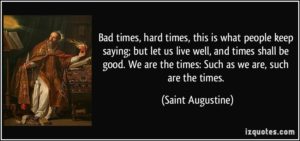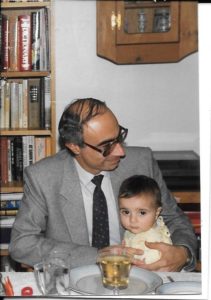
TRUMP RALLY, OCTOBER 23, 2016
“This fire in Chicago. Very sad. People are saying – I don’t know if it’s true; you tell me…but people are saying… people come up to me and they say that Hillary Clinton started that fire in 1871. I don’t know. I don’t know. Can you believe it? Obama says it was caused by a cow! A cow! He doesn’t understand cows. I understand cows. I’m the only one that understands cows. I understand cows better than the cow farmers, believe me. I don’t know. You tell me. And why were all those buildings made of wood? Terrible. Terrible. In my administration, every building will be made of adobe. We’re going to bring back the adobe industry. We’re going to have to have so many adobe jobs, you won’t believe the jobs. We’re going to give everyone the economics. And we’ll be doing something about this. We’ll be looking at things, believe me.”
VIA TWITTER OCTOBER 25, 2016, 1 a.m.
“Did Hillary invent poison? Some people are saying she did. We’ll be looking into things.”
VIA TWITTER OCTOBER 26, 2016, 3 a.m.
“Ted Cruz’s dad and Hillary Clinton… Kennedy assassination… you tell me…we’ll be looking at her situation.” #CRUZCLINTONKENNEDY
TRUMP RALLY OCTOBER 29, 2016
“That stock market crash in 1929. Sad. Obama shouldn’t have let the stocks out. Why didn’t they just take the stocks? l don’t know. I don’t know. You tell me. Hillary Clinton’s been in politics since World War Two started in 1920. She could have stopped the stock market crash. But Sidney Blumenthal and Alexander Hamilton….Such a shame. In my administration we’ll lock the stocks up immediately. It will be the first thing I do. The first thing I do. We’ll be locking up so many things, you won’t believe the things we’ll be locking up. We’ll be the world leaders in locking up. Nobody knows how to lock things up like I’ll lock things up.”
TRUMP RALLY OCTOBER 30, 2016
“I’m hearing more horrible things about Hillary Clinton and Ted Cruz’s dad. Horrible things. I wasn’t going to say it, but I have to say it. Do you want me to say it? Do you want me to say it? Alright I’ll say it. People are saying they were…well, I can’t say it. I don’t know. But she was 15. And she was in the Senate. She could have stopped the Kennedy assassination. Why didn’t she? You tell me. We’ll be looking at some things. That will be the first thing I do.”
VIA TWITTER OCTOBER 31, 2016, 4:16 a.m.
“Salem Witch Trials. Terrible. Obama and Hillary just let them happen. I love the witches. I’ll do so much for witches, you won’t believe how much I’ll do for witches. What have they got to lose?”
VIA TWITTER NOVEMBER 1, 2016, 3:37 a.m.
“I’ll release my tax returns when Hillary Clinton releases her 30,000 pages of diary entries from 1963.” #CRUZCLINTONKENNEDY
ENTRY DATED 11/22/1963 FROM THE 30,000 PAGES OF CLINTON’S 1963 DIARY RELEASED NOVEMBER 2, 2016:
“OMG, the President got shot! Dear Di, I swear Mr. Cruz and I HAD NOTHING TO DO WITH IT!!!!”
VIA TWITTER NOVEMBER 2, 2016, 4:01 a.m.
“I’ll release my tax returns when Crooked Hillary releases the ‘Lost’ Colony of Roanoke that she stole.”
TRUMP RALLY NOVEMBER 3, 2016
“Have you heard what happened in Hawaii? Terrible, just terrible. The Germans bombed the hell out of Pearl Harbor, just bombed the hell out of it. Obama and Hillary telegraphed that all those ships were going to be there in our biggest Pacific harbor. Did they do it on purpose? I don’t know. You tell me. When I’m president, nobody will know where the ships are.”
VIA TWITTER NOVEMBER 8, 2016
1:05 a.m. “The dinosaurs. People are asking me if this is another example of the mysterious deaths that happen around Crooked Hillary. This situation will be the first thing we do.” #NOTAMETEOR
1:30 a.m. “I’ll release my tax returns when Crooked Hillary releases my puppy that I ‘lost’ in Central Park in 1959.” #IMISSBUDDY
1:36 a.m. “What happened to all the passenger pigeons? There used to be millions of them. What does Crooked Hillary know about it? We’ll be looking at some things.” #BRINGBACKPP
2:01 a.m. “When I’m president the cyber the economics the African Americans will have excellence, so much excellence, you won’t believe my excellent African Americans.” #IHAVEAFRICANAMERICANS
2:30 a.m. “I’ll release my Muslims when the tax returns, excellent, so excellent, we’ll do very well on October 28, very well.”
2:59 a.m. “We’re looking at some things right now.” #BIGTITS
3:27 a.m. “Fatboy”
3:38 a.m. “Gargle”
TRUMP RALLY NOVEMBER 9, 2016
“Hillary and apples. At least two bloggers have reported to me privately that they have evidence that is unbelievable. Unbelievable. You wouldn’t even believe this evidence. I got it right off the cyber. These bloggers…I think one of them was named Beavis…I don’t know….you tell me…these bloggers are saying….incredible. Just incredible. She was going by the name ‘Eve.’ So she wasn’t using her real name. And she ate an apple that she shouldn’t have had. How did she get this apple? Did the ISIS give it to her? Did Sidney Blumenthal steal it from some hard-working family farmer? You tell me. You tell me. But we’ll be looking at some things. It will be the first thing we do. We’re going to do very well in the election tomorrow.”
 Many of us feel that the level of civility in our society has degraded, and fear that it will degrade further in the Age of Trump. Each of us has only limited power to change that, but we are morally obligated to exercise that power – especially when it feels most hopeless. I don’t by any means minimize the potential dangers of the next four years. But start with yourself. Start with what you can control. Here’s something really simple that you can do to ever-so-slightly raise the level of civility in our society: be a courteous driver. Just try it for a week.
Many of us feel that the level of civility in our society has degraded, and fear that it will degrade further in the Age of Trump. Each of us has only limited power to change that, but we are morally obligated to exercise that power – especially when it feels most hopeless. I don’t by any means minimize the potential dangers of the next four years. But start with yourself. Start with what you can control. Here’s something really simple that you can do to ever-so-slightly raise the level of civility in our society: be a courteous driver. Just try it for a week.
 On this date in 354, Aurelius Augustine, later known as Saint Augustine, was born in Thagaste, North Africa. His mother, Monica, was a Christian. His father, Patricius was a pagan and by all accounts an unfaithful and probably abusive husband. They were an upper-class family with rights of citizenship in the Empire, but far from rich. Patricius was a local official, which meant that he collected taxes and was responsible for public works and community governance. Part of his responsibility was to ensure that the locals didn’t rebel against the Empire in any significant way. Failure in this responsibility could result in his being fined into poverty or tortured. Patricius was proud of his son, but could not afford to educate him. Augustine’s education was financed by Romanian (whom I renamed Urbanus in my book because some early readers found the name Romanian confusing). Romanian was Patricius’, and later Augustine’s, patron. The patronage system was one of the backbones of late Roman life. The patron of a peasant would be the owner of the land he farmed. The patron of citizens of a small town like Thagaste would be a local official like Patricius. The patron of a minor official like Patricius would be someone more powerful in the Roman government, and so on. Your patron advanced your career when he could, provided financial help if needed, and advocated for you if you got into any legal trouble. In turn, you were expected to show loyalty to your patron and do any favors requested of you. Kind of like the Mafia, actually.
On this date in 354, Aurelius Augustine, later known as Saint Augustine, was born in Thagaste, North Africa. His mother, Monica, was a Christian. His father, Patricius was a pagan and by all accounts an unfaithful and probably abusive husband. They were an upper-class family with rights of citizenship in the Empire, but far from rich. Patricius was a local official, which meant that he collected taxes and was responsible for public works and community governance. Part of his responsibility was to ensure that the locals didn’t rebel against the Empire in any significant way. Failure in this responsibility could result in his being fined into poverty or tortured. Patricius was proud of his son, but could not afford to educate him. Augustine’s education was financed by Romanian (whom I renamed Urbanus in my book because some early readers found the name Romanian confusing). Romanian was Patricius’, and later Augustine’s, patron. The patronage system was one of the backbones of late Roman life. The patron of a peasant would be the owner of the land he farmed. The patron of citizens of a small town like Thagaste would be a local official like Patricius. The patron of a minor official like Patricius would be someone more powerful in the Roman government, and so on. Your patron advanced your career when he could, provided financial help if needed, and advocated for you if you got into any legal trouble. In turn, you were expected to show loyalty to your patron and do any favors requested of you. Kind of like the Mafia, actually. I’m writing this on Saturday, November 5 before we know who won the election. I will not change a word before publishing it on November 9.
I’m writing this on Saturday, November 5 before we know who won the election. I will not change a word before publishing it on November 9.

 Al and I have travelled outside the United States many times in the past several years. That was a dream of mine back when we were a financially-struggling young couple tied down by two young children. And so, in those days, we instead brought the world to us. Through the Pittsburgh Council for International Visitors, we occasionally hosted for a meal people who were visiting our city from other countries. Over the course of 3 or 4 years, we shared meals with two visitors from Egypt, two from Germany, and many from Japan. Our favorites, though, were a family from Syria: Professor H I, his wife N and their chubby, dark-eyed baby boy. (I use only their initials here, on the off chance that using their names could bring them harm)
Al and I have travelled outside the United States many times in the past several years. That was a dream of mine back when we were a financially-struggling young couple tied down by two young children. And so, in those days, we instead brought the world to us. Through the Pittsburgh Council for International Visitors, we occasionally hosted for a meal people who were visiting our city from other countries. Over the course of 3 or 4 years, we shared meals with two visitors from Egypt, two from Germany, and many from Japan. Our favorites, though, were a family from Syria: Professor H I, his wife N and their chubby, dark-eyed baby boy. (I use only their initials here, on the off chance that using their names could bring them harm)